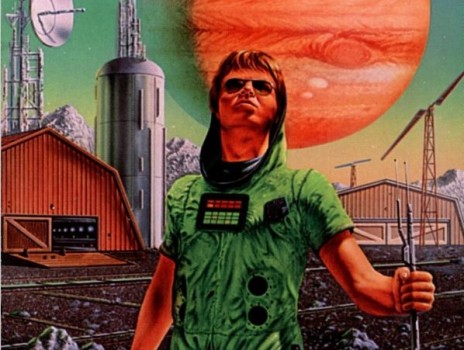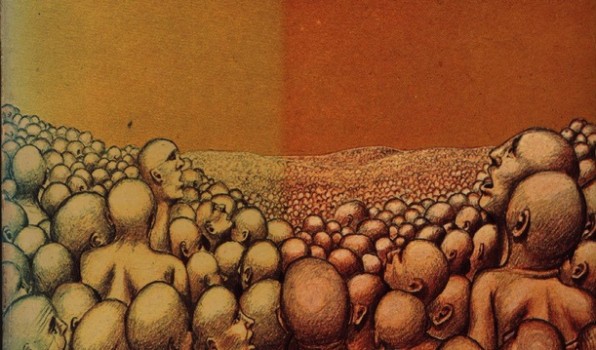I’ve been reading a lot of military science fiction lately and space operas. They’re two of my all-time favorite genres, and have been ever since I was a teenager.
But in the decades since I’ve been in high school I’ve spent a lot of time writing about finance, economics and international relations and it’s ruined a lot of popular plot elements for me.
Here are my top ones.
1. Colonists to new planets are mostly farmers

Why would colonists be farmers? Nobody likes farming — well, a few people do, the 1 percent of the population that is still farming. Why would people start liking farming more in the future?
And why would a space-fairing civilization mysteriously forget how to build farming machinery?
Some authors explain this away by saying that machinery breaks down, and colonists have to be self-sufficient, so that’s why the first few generations have to live off the land.
This makes no sense.
Shipping metal, or building stuff on-site, is much much cheaper than shipping human beings. Machinery doesn’t need life support. It can withstand more acceleration — or super-slow trips that take hundreds of years.
And yes, machinery breaks down. And then it gets fixed again. Instead of shipping over 100 farmers, ship out 1 farmer and 99 people with other jobs — including a few mechanics and engineers.
The only explanation I can see for this common thread is that when most people think of colonies, they think of Europeans coming to the U.S. Back in the days of farms, ranches, and plantations.
2. Those who aren’t farmers risk their lives in mines

So many miners. Planet-based miners, miners on moons, miners on asteroids, miners on mining ships. Risking their lives to eke out a few paltry mineral resources.
Why?
Why isn’t this work done by machinery, while people sit back in comfortable, client-controlled environments, far from any danger, and just oversee things?
3. The rest are either super rich or sitting around on the dole

I can see how someone living, oh, say, 200 years ago might think that the only jobs available to people were in farming, manufacturing, or being super rich. And that if people had all their basic commodity goods provided to them, they’d just sit around not doing anything except drinking and gambling.
But you’d think that the experience of the last few decades would have demonstrated to writers that low-cost food and consumer goods means that society has freed up opportunities for people to do cool new things. Like become scientists. Teachers. Doctors. Lawyers. Video game designers. Movie directors. Even writers.
In fact, the unemployment rate is not connected at all — except very temporarily, during periods of fast technological disruption — with progress.
For example, according to research from McKinsey, for every job eliminated by the Internet, 2.6 jobs have been created. And they’re not all Web development jobs. People are making money over the Internet selling hand-made crafts and organic wool. Making jokes while playing video games. Making up parodies of pop songs. Doing makeup tutorials.
Sure, some of us are perfectly happy to drop out of college, put on a pair of flip flops and just sit around watching TV and eating pizza in our parents’ basement. But it gets old quick. Next thing you know, you’re writing reviews of the shows you watch, or inventing new pizza recipes. Or you’re collecting pieces of old virtual reality headsets on auction sites, and selling your startup company to Facebook for $2 billion.
4. The gap between the rich and the poor will only grow
Look at Bill Gates. Now look at yourself. Now look back at Bill Gates. Now look back at yourself. Bill Gates has one spouse. You probably have a spouse. Bill Gates watched the same television and movies as you do, though maybe he gets them a little earlier. He listens to the same music. He wears the same clothes the rest of us do.
He probably has a little bit more legroom in his airplane than we do when we fly. And his reheated meals are served on nicer plates. But not that much more legroom. And the plates aren’t that much nicer.
If you meet him on the street, you might say hi to him, or ask for his autograph. You would not be surprised to bump into him or members of his family at a local mini-golf, fast-food restaurant or mall.
To someone from 200 years in the past — or 200 years in the future — your lifestyle and his might seem pretty much identical. The big difference between Bill Gates and you is that his bank account has more numbers in it. And he gets to cure millions of people from malaria, and you might only be able to afford to cure a few dozen.
Now consider the difference between the rich and the poor in the past. The poor weren’t allowed to even look at the rich and had to bow down as the rich went past them. The rich had clothing so complicated that they need staffs of servants just to get them dressed in the morning. The rich had kitchen staffs, and the poor ate gruel for every meal.
The rich could rape and kill with impunity, and could keep other people as slaves.
Over the last couple of thousand years, the general progression has been more and more practical equality between the richest and the poorest people in a country. More recently, that has been accelerating, with a billion people coming out of subsistence farming over the last couple of decades — and one of the first things they buy is a smartphone.
Finally, the wealth that the rich used to have was wealth that was removed from the economy and stored in castle treasuries. Today, the wealth of rich people is all in investment funds and banks. It’s used to help other people start and expand businesses, build houses, buy cars, and get college educations.
Why would this trend suddenly reverse itself? Occasionally, a writer would cite a disaster of one kind or another but for the most part it’s taken as a given that the practical disparity between the lifestyles of the rich and poor will increase in the future, instead of continuing to shrink.
5. Overpopulation will lead to disaster

This one is extremely common. For some reason, many science fiction writers stopped studying history at Malthus, and still believe that human population expands exponentially.
In fact, as economies improve, population growth tends to drop below replacement levels. Many countries in Europe and Asia are approaching demographic crises caused not by too many people, but too few.
Old people are living longer, more active lives, and there aren’t enough young people to pay for all this retirement. The obvious solution, of course, is to simply raise the retirement age until parity is achieved again, but that’s politically unpopular and so will take a bit of time to implement.
But on the whole, rich people have fewer kids, not more. So while population will continue to increase for a little while longer, due to Africa and South America, all the signs indicate that this trend is about to reverse itself as the rest of the world’s economies continue to improve.
6. Emperors and slavery will make a comeback

In recent history — the past couple of thousand years, say — the general political trajectory has been towards better government. There are more controls on the rulers, more respect for individuals, more protections, less violence, less corporal punishment.
I’m not saying that there haven’t been exceptions, or that it hasn’t been two-steps-forward-one-step-back the whole time, but the general direction of progress has been… towards progress.
In the future, however, old political structures will make a comeback on a massive scale. We’ll have galactic emperors, the slave trade will make a comeback, corporations will take over governments, or we’ll all be living in repressive, church-run theocracies.
Whatever the horrible political structure of the past, there’s a science fiction future that embodies it.
Why? Are science fiction writers worried that if they don’t warn us about the evils of slavery, we’re going to go and make it legal again?
7. Medicines will never go off patent

This might seem like a minor quibble, but it has dramatic repercussions for society.
Our current patent laws allow pharmaceutical companies to invest simply staggering amounts of money in research, hoping to get the money back while the drugs they invented are protected by patents.
This results in some very high-priced drugs that insurance companies may or may not decide to cover.
Many science fiction writers jump on this fact to predict that when life extension treatments come out, they will only be available to the rich.
Which does seem likely. Treatments designed to extend life, rather than cure some life-threatening ailment, especially expensive treatments, aren’t likely to be covered by most health insurance companies.
From this, some science fiction writers conclude that we will have a permanent underclass of poor people with short life spans, and rich people who will be able to live forever.
Forgetting that patents expire and then competitors come in with cheap, generic versions of those treatments.
And it’s a good thing, too, because otherwise our falling reproduction rates would cause humans to go extinct.
8. Technological progress will stop
I understand that this is a hard one to avoid. Predicting technological progress for the next 25 or 50 years is hard enough, though many science fiction have done an admirable job at it.
Predicting technological progress 1,000 years into the future is pretty much impossible. So it makes sense that a writer would take the technology we have today, add some faster-than-light drives, make the computers just a little bit smarter, add some useful new materials, and then hit the pause button on innovation.
After all, imagine trying to write a multi-generational space saga in which people live for hundreds of years each, while having to invent new social and technological changes for every decade along the way.
But while I understand the motivation, I’m increasingly annoyed each time I come across a thousand-year-old galactic empire where nothing substantive has changed in all that time.
- OpenSim user growth cools down with chilly weather - November 15, 2024
- Kitely adds PBR materials support, larger textures - November 8, 2024
- OSCC 2024 Submission Deadline Approaching - October 19, 2024
